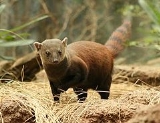
Ring-tailed mongoose
Encyclopedia
The Ring-tailed mongoose (Galidia elegans) is a euplerid
that lives on the island of Madagascar
. There is actually much disagreement about the placement of Madagascar's carnivores including the Ring-tailed mongoose, within the phylogenetic tree. Recent molecular work by Anne Yoder et al. (2003) reported in the journal "Nature" suggests that the Malagasy Carnivora evolved from a single herpestid (mongoose) ancestor.
The Ring-tailed mongoose is relatively small but is the largest member of the Subfamily Galidiinae. It is usually 32 to 38 cm (12.5 to 15 in) long and weighs only 700 to 900 g (24 to 32 oz). Its body is long and slender, and the rounded head has a pointed snout. The body is a dark red color and the feet are black. As the name implies, its bushy tail is covered with black and red rings.
Ring-tailed mongooses are very agile, and good climbers. They are quite playful and are active during the day. Their habitat consists of humid forests.
Their diet is mostly of small mammals, invertebrates, fish, reptiles and eggs, but they occasionally eat insects and fruit.
The population of Ring-tailed mongooses has decreased by 20% over the past ten years due to habitat loss. Another problem is competition with the small Indian civet
(Vivericula indica).
Eupleridae
The family Eupleridae is a group of carnivorans endemic to Madagascar and comprising 10 known species in seven genera. Probably the best known species is the Fossa , in the subfamily Euplerinae...
that lives on the island of Madagascar
Madagascar
The Republic of Madagascar is an island country located in the Indian Ocean off the southeastern coast of Africa...
. There is actually much disagreement about the placement of Madagascar's carnivores including the Ring-tailed mongoose, within the phylogenetic tree. Recent molecular work by Anne Yoder et al. (2003) reported in the journal "Nature" suggests that the Malagasy Carnivora evolved from a single herpestid (mongoose) ancestor.
The Ring-tailed mongoose is relatively small but is the largest member of the Subfamily Galidiinae. It is usually 32 to 38 cm (12.5 to 15 in) long and weighs only 700 to 900 g (24 to 32 oz). Its body is long and slender, and the rounded head has a pointed snout. The body is a dark red color and the feet are black. As the name implies, its bushy tail is covered with black and red rings.
Ring-tailed mongooses are very agile, and good climbers. They are quite playful and are active during the day. Their habitat consists of humid forests.
Their diet is mostly of small mammals, invertebrates, fish, reptiles and eggs, but they occasionally eat insects and fruit.
The population of Ring-tailed mongooses has decreased by 20% over the past ten years due to habitat loss. Another problem is competition with the small Indian civet
Small Indian Civet
The Small Indian Civet or Rasse is a species of civet found across south and South-east Asia as well as in the Indonesian archipelago. The Assamese name Johamaal refers to its glandular odour similar to a scented rice variety called Joha...
(Vivericula indica).
External links
- Animal Diversity Web Ring-tailed mongoose
- Malagasy ring-tailed mongoose (Galidia elegans) - ARKive.org

